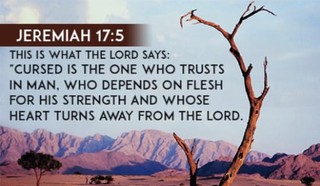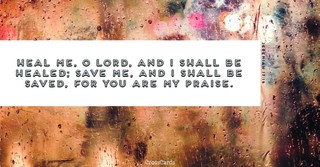
- Recent Translations
- All Translations
Jeremiah 17:6
Share
Settings
Jeremiah 17:6 Meaning and Commentary
For he shall be like the heath in the desert
The Vulgate Latin version renders it, "myrice": and so the Latin interpreter of the Targum; but the word that paraphrase makes use of according to R. Hai, mentioned by Kimchi, signifies something that is thorny without, and eatable within; but this is not likely to be intended here. The Septuagint version renders it, "wild myrice"; it seems to be the same that is called "erice", or "ling", and "heath"; which delights to grow in wild and waste places; hence such with us are called "heaths", whether this grows upon them or not. It is a low shrub, fruitless and useless; and, because neither bears fruit nor seed, is reckoned by Pliny F15 among unhappy plants, and such as are condemned or forbid religious uses; and very fit to represent such persons as truest in men and in themselves, and not in the Lord: and shall not see when good cometh;
perceive or receive any advantage by rain coming upon it; as such persons do not receive any good by the pure ministration of the word, compared to rain; and so the self-righteous Jews did not see when the Messiah came, who is goodness itself; nor see him, and embrace him, nor his righteousness; but rejected him and that; went about to establish their own, and did not submit to his; nor did they attain to righteousness, or enjoy eternal life; as is the case of all self-justiciaries: but shall inhabit the parched places in the wilderness, in a salt land,
and not inhabited:
which became literally true of the land of Judea, for the rejection of the Messiah, and trust in themselves; see ( Deuteronomy 29:23 ) and may fitly represent the barren pastures of a man's own works of righteousness, which such as trust in themselves feed upon. All the characters are expressive of barrenness, as a wilderness, places parched with heat, and where salt is; for, as Pliny F16 says, where salt is found, it is barren, and produces nothing.
F15 Nat. Hist. l. 13. c. 21. & l. 16. c. 26. & l. 24. c. 9.
F16 Nat. Hist. l. 31. c. 7.
